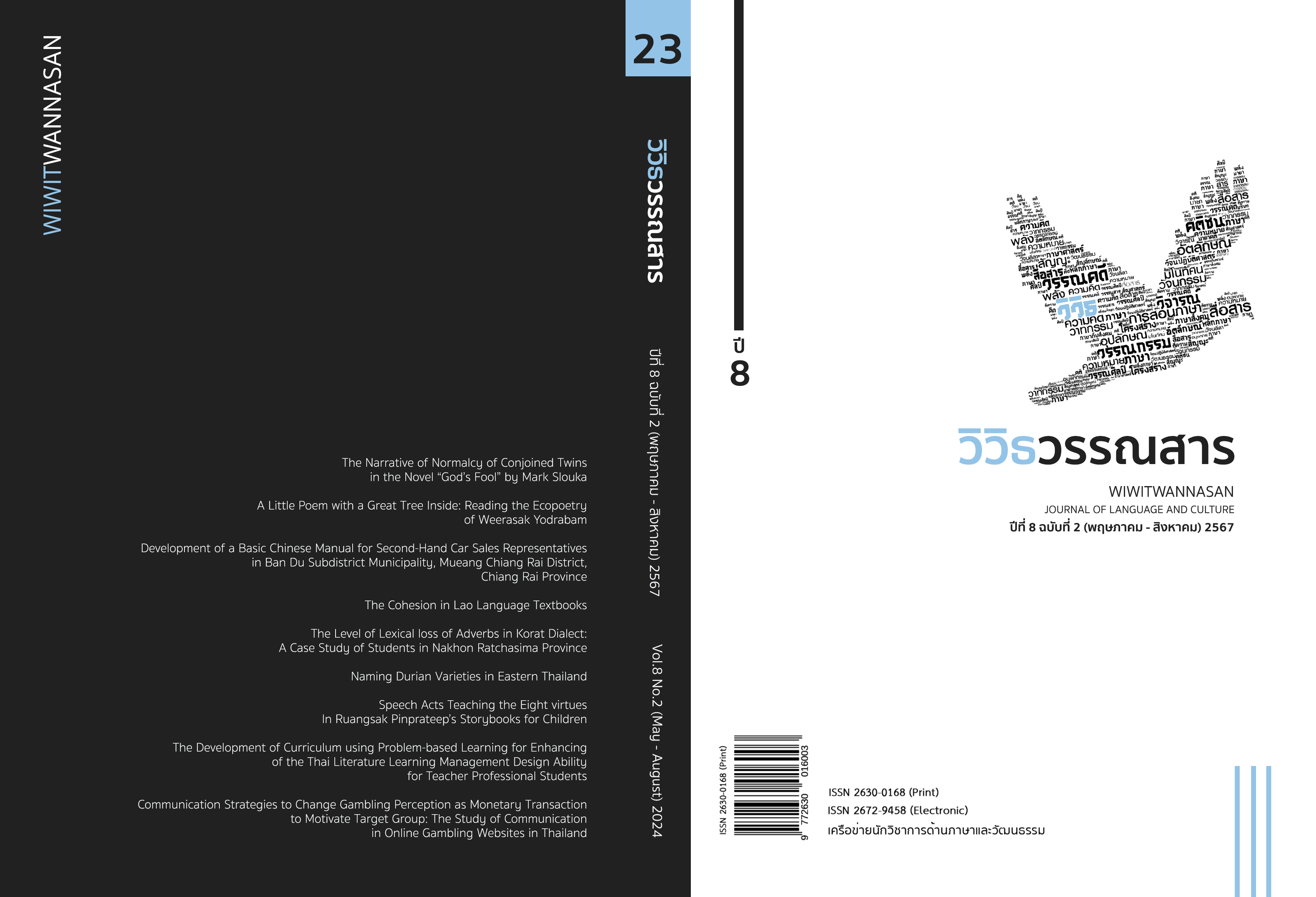กวีนิพนธ์เล็กๆ ที่มีต้นไม้ใหญ่อยู่ข้างใน : อ่านกวีนิพนธ์เชิงนิเวศ ของวีระศักดิ์ ยอดระบำ
Main Article Content
บทคัดย่อ
บทความนี้มีวัตถุประสงค์เพื่อศึกษากวีนิพนธ์ของวีระศักดิ์ ยอดระบำ จำนวนสองเรื่อง ได้แก่ “นกเถื่อนเท่านั้นที่รู้ว่าฤดูใบไม้ผลิยังจะมา” และ “เมล็ดเล็กเล็กมีต้นไม้ใหญ่อยู่ข้างใน” โดยใช้กรอบแนวคิด การวิจารณ์เชิงนิเวศ กวีนิพนธ์เชิงนิเวศและกวีศาสตร์เชิงนิเวศ เพื่อตรวจสอบว่ากวีนิพนธ์ของวีระศักดิ์ ยอดระบำ สอดคล้องกับลักษณะของกวีนิพนธ์เชิงนิเวศหรือไม่ อย่างไร ผลการศึกษาพบว่า กวีนิพนธ์ของวีระศักดิ์ ทั้งสองเรื่อง มีสารัตถะสำคัญคือการนำเสนอให้เห็นสำนึกเชิงนิเวศและตัวตนเชิงนิเวศของกวีที่ศรัทธาและยึดมั่นในการใช้ชีวิตที่สวนทางกับการพัฒนาในระบบทุนนิยม โดยสะท้อนผ่านมโนทัศน์ที่สำคัญซึ่งสอดคล้องกับคุณลักษณะของกวีนิพนธ์เชิงนิเวศ ได้แก่กระบวนทัศน์และสำนึกเชิงนิเวศที่ปฏิเสธการยึดมนุษย์เป็นศูนย์กลาง ด้วยการมองโลกธรรมชาติอย่างเคารพนบนอบ ยอมรับความยิ่งใหญ่และอิสระของธรรมชาติ ตระหนักว่าโลกดำรงอยู่ด้วยการผสานกันของสายใยแห่งชีวิต มีพลวัตและความเคลื่อนไหว ธรรมชาติจึงเป็นครูที่ยิ่งใหญ่ สำหรับวีระศักดิ์ ยอดระบำ ธรรมชาติ ชีวิตและกวีนิพนธ์คือสิ่งเดียวกัน
Article Details

อนุญาตภายใต้เงื่อนไข Creative Commons Attribution-NonCommercial-NoDerivatives 4.0 International License.
ลิขสิทธิ์ของบทความเป็นของวารสาร การพิมพ์ซ้ำจะต้องได้ร้บการอนุญาตจากบรรณาธิการวารสาร
เอกสารอ้างอิง
Aleyna, O. (2020). Ecocriticism and Ecopoetry: The Interdisciplinary Case Study of The Lordof the Flies and Do Not Go Gentle Into That Good Night. https://www.academia.edu/50913289/Ecocriticism_and_Ecopoetry
Berdinesen, H. (2018). On Ecopoetry and Ecocriticism. e-journal for philosophy & culture. https://philosophia-bg.com/archive/philosophia-20-2018/on-ecopoetry- and-ecocriticism/
Bryson, S. J. (2002). Ecopoetry: A critical Introduction. In J. S. Bryson (Ed,) Salt Lake: University of Utah Press.
Buell, L. (1995) The Environmental Imagination: Thoreau, Nature Writing and the Formation of American Culture. Cambridge & London: Harvard University Press.
Burke, D. E. (2014). From Pastorals to Paterson: Ecology in the Poetry and Poetics of William Carlos Williams. http://epublications.marquette.edu/dissertations_mu/387
Chalise, R, K.. (2020). Ecopoetics in Thoreau: Nature Ethics, Life, Purity and Ontology. Global Journal of Human-Social Science: Geography, Geo-Sciences, Environmental Science & Disaster Management, Vol. 20, Issue 4, Version 1.0.
Franca,B, & Rauscher, J.(2019). Toward an Ecopoetics of Randomness and Design: An Introduction. Ecozone, 10 (1) 1-23. https://ebuah.uah.es/dspace/bitstream/handle/10017/37660/toward_bellarsi_ecozon
Glossary of Poetic Terms. (2024). https://www.poetryfoundation.org/learn/glossary- terms/ecopoetics
Golda,L. (2019). Raising Ecological Conciousness through Ecopoetry. · https://www.researchgate.net/publication/336830080
Keawsi, P., Nakkaew, P., Choojanthong, R, Viriyasattha N., Dinlansagoon, M. & Jeennoon, P. (2021). Status of Literature Research Using the Concept of Ecological Conscience Between 1994 – 2020 . The 12th Hatyai National and International Conference (pp.418 – 433). Hatyai University. (In Thai)
Massie, J, (2018). Language Poetry and Ecopoetry: A Shared Pragmatic Work in A.R. Ammons, Charles Bernstein, Susan Howe, and W.S. Merwin [Doctoral dissertation]. University of East Anglia.
Nambrol, N. (2016). Ecocriticism : An Essay. Literary Theory and Criticism Blog. https://literariness.org/2016/11/27/ecocriticism/
O’Loughlin, J. C. (2022). The Language of Ecopoetry and the Transfer of Meaning. The Trumpeter, 38, 1. https://id.erudit.org/iderudit/1095383ar
Plessis & Brandon. (2015). An ecological worldview as basis for a regenerative sustainability paradigm for the built environment. Journal of Cleaner Production, 109, 53-61. https://www.sciencedirect.com/
Rigby ,K. (2016). Ecopoetics From the book Keywords for Environmental Studies. https://www.degruyter.com/document/doi/10.18574/nyu/9780814760741
Skinner, J. (2005). Boundary Work in Mei-Mei Berssenbrugge's Pollen. Association for the Study of Literature and Environment Biennial Conference. Eugene, University of Oregon.
Tae Jun Cha. (2018). How to Preserve Nature through Poetry: Ecopoetry of W. S. Merwin. International Journal of English Literature and Social Sciences (IJELS), 3 (6), (pp.1050-1058). https://dx.doi.org/10.22161/ijels.3.6.20.
Walton, S. (2018) 'Ecopoetry. In N. Castree, M. Hulme, & J.D. Proctor, (Eds). Companion to environmental studies (pp. 393-398). Abingdon: Routledge. https://www.routledge.com/Companion-to- Environmental-Studies/Castree-Hulme- Proctor/p/book/9781138192201
Welch, J.T. (2014). Entangled Species: The Inclusive Posthumanist Ecopoetics of Juliana Spahr. The Journal of Ecocriticism, 6 (1), spring 2014. https://ojs.unbc.ca/index.php/joe/article/view/502/491
Yodrabam, W. (2018). Within the Little Seeds Are the Big Tree. Pathumthani: Nakhon Publishing House. (In Thai)
Yodrabam, W. (2019). Only the Wild Bird Knows That Spring Will Come. Pathumthani: Nakhon Publishing House. (In Thai)


